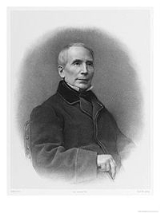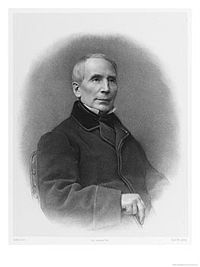
Armand-Pierre Caussin de Perceval
Encyclopedia

Oriental studies
Oriental studies is the academic field of study that embraces Near Eastern and Far Eastern societies and cultures, languages, peoples, history and archaeology; in recent years the subject has often been turned into the newer terms of Asian studies and Middle Eastern studies...
.
He was born in Paris
Paris
Paris is the capital and largest city in France, situated on the river Seine, in northern France, at the heart of the Île-de-France region...
on 13 January 1795. His father, Jean Jacques Antoine Caussin de Perceval (1759–1835), was professor of Arabic
Arabic language
Arabic is a name applied to the descendants of the Classical Arabic language of the 6th century AD, used most prominently in the Quran, the Islamic Holy Book...
in the Collège de France
Collège de France
The Collège de France is a higher education and research establishment located in Paris, France, in the 5th arrondissement, or Latin Quarter, across the street from the historical campus of La Sorbonne at the intersection of Rue Saint-Jacques and Rue des Écoles...
.
In 1814 he went to Constantinople
Constantinople
Constantinople was the capital of the Roman, Eastern Roman, Byzantine, Latin, and Ottoman Empires. Throughout most of the Middle Ages, Constantinople was Europe's largest and wealthiest city.-Names:...
as a student interpreter, and afterwards travelled in Asiatic Turkey
Turkey
Turkey , known officially as the Republic of Turkey , is a Eurasian country located in Western Asia and in East Thrace in Southeastern Europe...
, spending a year with the Maronites in the Lebanon
Lebanon
Lebanon , officially the Republic of LebanonRepublic of Lebanon is the most common term used by Lebanese government agencies. The term Lebanese Republic, a literal translation of the official Arabic and French names that is not used in today's world. Arabic is the most common language spoken among...
, and finally becoming dragoman
Dragoman
A dragoman was an interpreter, translator and official guide between Turkish, Arabic, and Persian-speaking countries and polities of the Middle East and European embassies, consulates, vice-consulates and trading posts...
at Aleppo
Aleppo
Aleppo is the largest city in Syria and the capital of Aleppo Governorate, the most populous Syrian governorate. With an official population of 2,301,570 , expanding to over 2.5 million in the metropolitan area, it is also one of the largest cities in the Levant...
. Returning to Paris, he became professor of modern Arabic in the School of Living Oriental Languages
Institut national des langues et civilisations orientales
The Institut National des Langues et Civilisations Orientales is located in Paris, France. It was founded in 1795 after the French Revolution and is now one of the country's Grands établissements with a specialization in African, Asian, East European, Oceanian languages and civilisations...
in 1821, and also professor of Arabic in the Collège de France in 1833. In 1849 he was elected to the Academy of Inscriptions
Académie des Inscriptions et Belles-Lettres
The Académie des Inscriptions et Belles-Lettres is a French learned society devoted to the humanities, founded in February 1663 as one of the five academies of the Institut de France.-History:...
. He died on 15 January 1871 at the Siege of Paris
Siege of Paris
The Siege of Paris, lasting from September 19, 1870 – January 28, 1871, and the consequent capture of the city by Prussian forces led to French defeat in the Franco-Prussian War and the establishment of the German Empire as well as the Paris Commune....
.
Caussin de Perceval published (1828) a useful Grammaire arabe vulgaire, which passed through several editions (4th ed., 1858), and edited and enlarged Élie Bocthor's Dictionnaire français-arabe (2 vols., 1828; 3rd ed., 1864); but his great reputation rests almost entirely on one book, the Essai sur l'histoire des Arabes avant l'Islamisme, pendant l'époque de Mahomet (3 vols., 1847–1849), in which the native traditions as to the early history of the Arabs, down to the death of Muhammad
Muhammad
Muhammad |ligature]] at U+FDF4 ;Arabic pronunciation varies regionally; the first vowel ranges from ~~; the second and the last vowel: ~~~. There are dialects which have no stress. In Egypt, it is pronounced not in religious contexts...
and the complete subjection of all the tribes to Islam
Islam
Islam . The most common are and . : Arabic pronunciation varies regionally. The first vowel ranges from ~~. The second vowel ranges from ~~~...
, are brought together with wonderful industry and set forth with much learning and lucidity. One of the principal manuscript sources used is the great Kitab al-Aghani
Kitab al-Aghani
Kitab al-aghani , is an encyclopedic collection of poems and songs that runs to over 20 volumes in modern editions by the 8th/9th-century litterateur Abu l-Faraj al-Isfahani . Abu l-Faraj claimed to have taken 50 years in writing the work, which ran to over 10 000 pages...
of Abu al-Faraj, which has since been published (20 vols., Boulak
Boulaq
Boulaq is a district of Cairo, Egypt. It neighbours Downtown Cairo, Azbakeya, and the River Nile.The name Boulaq comes from the French 'Bon Lac', which literally means 'Good Lake'. The name was arabised into Bolaq, which in Egyptian dialect is pronounced 'Bolaa'.-History:Following the Baybars’s...
, 1868) in Egypt
Egypt
Egypt , officially the Arab Republic of Egypt, Arabic: , is a country mainly in North Africa, with the Sinai Peninsula forming a land bridge in Southwest Asia. Egypt is thus a transcontinental country, and a major power in Africa, the Mediterranean Basin, the Middle East and the Muslim world...
; but no publication of texts can deprive the Essai, which is now very rare, of its value as a trustworthy guide through a tangled mass of tradition.

